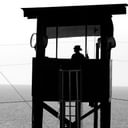New York Times
Thursday, November 15, 2001
A day after President Bush signed an order allowing special military tribunals to try foreigners charged with terrorism, a more detailed picture of what government planners envision began to emerge.
Witnesses would be sworn to tell the truth, just as they are in American courtrooms. But they might testify behind closed doors, a Bush administration official said yesterday.
A defendant would not necessarily get his choice of a lawyer. Instead of jurors, military officers — perhaps five of them on a panel — would render verdicts in places far from home, like Afghanistan or Pakistan.
It was an unfamiliar picture of American justice, with unusual shortcuts and limited appeal rights. Supporters said the war required that the country not allow legal fine points to stand in its way. “The idea is, you need swift justice,” said Jack Goldsmith, a law professor at the University of Chicago.
Critics said the trials could seem unfair because they would not provide the protections of American courts and might further inflame Muslim critics here and abroad.
“If we do it through a military trial, people around the world will view the outcome as a foregone conclusion,” said David Wippman, a law professor at Cornell University.
A trial before a military tribunal would resemble a traditional trial in that prosecutors would file formal charges against a person for terrorist activities — an Al Qaeda leader captured in Afghanistan, for example.
But the similarities would end there. Commission tribunals will accept evidence that is typically barred from court, like hearsay, which would make it easier for prosecutors to prove their cases. Even a death penalty could be imposed without the unanimity required of civilian juries. A two-thirds vote of the panel of officers would be sufficient.
Legal experts predicted court challenges to the plan. Some said it was unclear whether courts would agree that the current circumstances justified military commissions.
Such tribunals have a long international history. They have been used in this country at least since 1780, when George Washington appointed a board of officers to try Maj. John Andre, a British spy who slipped behind American lines to gather information from Benedict Arnold.
“There certainly are precedents through history for military commissions, but that doesn’t mean the president has the constitutional authority to use them whenever he says there’s an emergency,” said Christopher L. Eisgruber, director of the program in law and public affairs at Princeton University.
But American courts have often been reluctant to second-guess the president about when commissions are justified. After a secret 18-day trial by a military commission in 1942, the Supreme Court approved the conviction of a group of Germans who landed by submarine on the beaches of Florida and Long Island with plans to use explosives for sabotage.
In 1946, the justices approved a commission conviction of the commanding general of the Japanese army in the Philippines, Tomoyuki Yamashita. Both of the World War II trials ended in executions.
Historians say military commissions began as traveling courts when there was a need to impose quick punishments that appeared fair in wartime. Commissions do not enforce any single country’s law, but a body of international law that has developed through centuries known as the law of war.
One of the fundamental principles of that body of law is that combatants cannot target civilians.
In its 1946 ruling, the Supreme Court said American commanders had the power “to seize and subject to disciplinary measures those enemies who, in their attempt to thwart or impede our military effort, have violated the law of war.”
A Bush administration official with knowledge of the planning said officials had been studying the World War II cases. But the official said the decision to authorize the tribunals had been influenced by factors like the ability of the tribunals to move quickly and to limit intelligence information that might become public.
In civilian trials, a defendant has broad access to prosecution information. But the military tribunals could sharply limit a defendant’s access to intelligence reports and could close entire proceedings if classified information were to be discussed.
The trials would shortcut many of the rules that slow trials. Extensive rules, for instance, generally bar the use in civilian trials of illegally seized evidence. But under the president’s order, all evidence that would “have probative value to a reasonable person” is to be considered by the tribunals.
The Bush official who described the creation of the tribunals said such choices were made to assure that the process did not get bogged down. But he said many people inside the government were working to assure that the trials remained fair. For example, he said, officials generally favor insisting that prosecutors prove guilt beyond a reasonable doubt.
Mr. Bush’s order left open the possibility that commission trials could be held in the United States. But the official said the procedure was intended largely for use elsewhere in the world for the trial of Al Qaeda members and other terrorists.
“I would find it very unlikely,” the official said, “that we are going to do these trials on the territory of the United States.”



